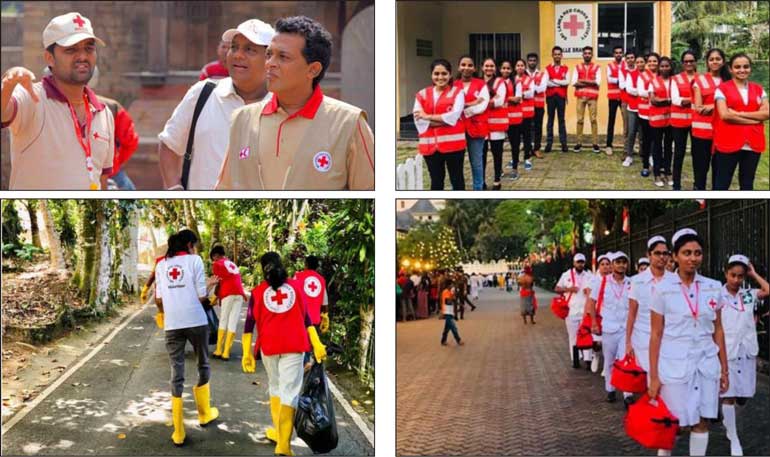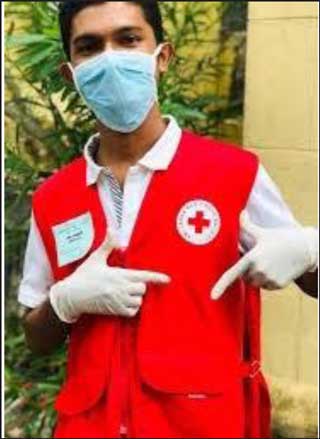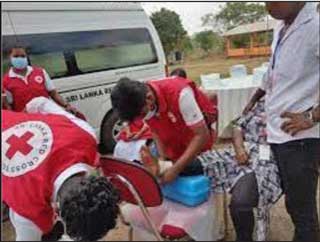Thursday Feb 19, 2026
Thursday Feb 19, 2026
Saturday, 28 October 2023 00:20 - - {{hitsCtrl.values.hits}}

 “The heart of a volunteer is never measured in size, but by the commitment to make a difference in the lives of others” –
“The heart of a volunteer is never measured in size, but by the commitment to make a difference in the lives of others” –
Deann Hollis
Volunteerism is a basic expression of human relationships to have an ultimate goal of more inclusive and effective development in the big society, emphasising community empowerment and participation.
Volunteers are major components in the civil society since they tend to improve social cohesion and increasing civic engagement among the community. People belong to communities and those communities are established on the basis of geographical location, shared characteristics or common interests.
Volunteerism is a major concept representing the community among multicultural society without having any restrictions or limitations.
It is a term described to benefit communities because it involves providing services, such as social care, working for charitable organisations or simply by involving interaction across social divides. Especially this concept brings coexistence and harmony among ethnicities and religions. Volunteerism also forms the backbone of many national and international non-governmental organisations and other civil society organisations, as well as social and political movements. Volunteers are more likely seeking out opportunities to help, especially in emergencies they tend to give assistance willingly. Everywhere, every day and every minute people are volunteering to mitigate the global issues, humanitarian crisis, and contribute to the sustainable development goals. Volunteerism is an important vehicle for sustainable development and disaster risk management in the society. Especially they deliver basic servicers, provide technical support and enhance capacity in all the major areas.
It is a concept which offers peace and harmony within the society by engaging volunteers from diverse backgrounds and filling the gap between rich and poor or the gap between religions and ethnicities. It brings collaboration, coexistence and spreading peace, happiness and development all over the places.
The Sri Lanka Red Cross Society (SLRCS) is a humanitarian organisation that relies heavily on volunteers to carry out its mission of providing assistance and support to people in need. It became a major power house for volunteers to enhance their capabilities and skills by providing their assistance to the community.
Volunteerism is a fundamental aspect of the Red Cross movement worldwide, and it plays a crucial role in Sri Lanka as well. Currently it has approximately 100,000 members and volunteers across the island, with over 6,500 active volunteers and now they have been the backbone of the national society. Each of the SLRCS branches work with and through the volunteers to help the community in a variety of service areas. Health challenges such as HIV and AIDS, blood donor campaigns, disaster relief, water and sanitation, and many other areas are examples of such activities.
 |
 |
The SLRCS actively recruits and trains volunteers from various backgrounds, age groups, and communities. Volunteers are selected based on their willingness to help and their commitment to the Red Cross principles of humanity, impartiality, neutrality, independence, voluntary service, unity, and universality.
Red Cross volunteers are trained in first aid and basic healthcare, enabling them to provide immediate medical assistance in emergencies. They may also participate in health camps and awareness programs to promote health and hygiene practices in communities. Some Red Cross volunteers are involved in community development projects that aim to improve the living conditions and resilience of vulnerable communities. These projects can include initiatives related to clean water access, sanitation, livelihood support, and education. The SLRCS places a strong emphasis on involving youth in volunteer activities.
Youth volunteers are engaged in various youth-led initiatives and programs aimed at building a sense of responsibility, leadership, and social engagement among young people.
Red Cross volunteers receive ongoing training and support to enhance their skills and knowledge. This includes training in disaster management, first aid, and humanitarian principles. Volunteerism with the Sri Lanka Red Cross Society is a meaningful way for individuals to contribute to the well-being of their communities and the country as a whole. It allows people to make a positive impact during times of crisis and also engage in long-term projects that improve the overall quality of life for vulnerable populations.
Volunteers from various cultural backgrounds work together to ensure that aid is distributed impartially, helping build trust and solidarity among diverse communities. Likewise, SLRCS volunteers actively contribute to the crisis response and relief. SLRCS volunteers who speak multiple languages can bridge communication gaps between the Red Cross and multicultural communities. This linguistic diversity ensures that information, instructions, and support are accessible to everyone, regardless of their language proficiency.
SLRCS promotes inclusivity by involving volunteers from various backgrounds, SLRCS sets an example of inclusivity. It demonstrates that humanitarian work transcends cultural and ethnic boundaries, encouraging greater social cohesion. Volunteers trained in conflict resolution and mediation can help mitigate tensions that may arise in multicultural settings. Their skills enable them to facilitate dialogues and foster peaceful coexistence. SLRCS volunteers often engage in community development projects aimed at enhancing the resilience of vulnerable populations. These projects can be tailored to address the unique challenges faced by different cultural groups, thus fostering community cohesion and self-reliance.
The volunteerism efforts of the Sri Lanka Red Cross Society contribute to creating a more inclusive, harmonious, and resilient multicultural society. By embracing diversity, respecting cultural differences, and actively involving volunteers from various backgrounds, SLRCS helps build stronger, more united communities that can better withstand and recover from various challenges and crises. The volunteers from diverse backgrounds inside the SLRCS signifies the positive impact to the multicultural society and it brings coexistence among religions and ethnicities for a peaceful and prosperous development to the country.
(The writer is the Manager, International Affairs and Branch Coordination – SLRCS.)